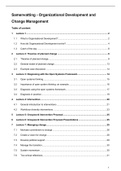lOMoARcPSD|2374147
Samenvatting - Organizational Development and
Change Management
Table of content
1 Lecture 1 ................................................................................................................................... 2
1.1 What is Organisational Development? ................................................................................ 2
1.2 How did Organizational Development evolve? ................................................................... 4
1.3 Catch of the day .................................................................................................................. 8
2 Lecture 2: Theories of planned change ................................................................................. 8
2.1 Theories of planned change................................................................................................ 9
2.2 General model of planned change .................................................................................... 13
2.3 Example case discussion .................................................................................................. 14
3 Lecture 3: Diagnosing with the Open Systems Framework ............................................... 14
3.1 Open systems thinking ...................................................................................................... 15
3.2 Importance of open system thinking: an example ............................................................. 16
3.3 Diagnosis using the open systems framework .................................................................. 17
3.4 Diagnosis in practice ......................................................................................................... 19
4 Lecture 4: Intervention........................................................................................................... 20
4.1 General introduction to interventions ................................................................................ 21
4.2 Workforce diversity interventions ...................................................................................... 23
5 Lecture 5: Groupwork Intervention Proposal ...................................................................... 25
6 Lecture 6: Groupwork Intervention Proposal Presentations ............................................. 25
7 Lecture 7: Managing change ................................................................................................. 25
7.1 Motivate commitment to change ....................................................................................... 26
7.2 Create a vision for change ................................................................................................ 28
7.3 Develop political support ................................................................................................... 29
7.4 Manage the transition........................................................................................................ 30
7.5 Sustain momentum ........................................................................................................... 30
7.6 Two critical reflections ....................................................................................................... 31
1
, lOMoARcPSD|2374147
8 Lecture 8: Does Organizational Development work? Evaluating change ........................ 31
8.1 Evaluation: why? ............................................................................................................... 31
8.2 Evaluation: what? .............................................................................................................. 33
8.3 Evaluation: Self-Study Example Case .............................................................................. 35
8.4 Measurement .................................................................................................................... 36
8.5 Catch of the day ................................................................................................................ 39
9 Lecture 9: Cancelled .............................................................................................................. 40
10 Lecture 10: Meet the OD expert ......................................................................................... 40
10.1 ODCM in a nutshell ........................................................................................................... 40
11 Lecture 11: Leaders driving development........................................................................ 42
11.1 Neuroscience Principles applied to Organizational Change ............................................. 43
11.2 Organizational coaching.................................................................................................... 45
12 Lecture 12: Exam info and Q&A ........................................................................................ 46
13 Questions ............................................................................................................................ 49
1 Lecture 1
1.1 What is Organisational Development?
“If you think there is consensus on what Organizational Development is, you haven't been around
long enough” (Craig Yeatman)
An organization:
- 70 years ago:
o Stable jobs, stable industries, stable environments
o Low-skilled, manufacturing work
- Today: change
o Older employees
o Diversity as a result of globalization
o Technological development
o Service jobs
o Economic and health crises
o Work-life balance
2
, lOMoARcPSD|2374147
o …
o
1.1.1 The difference between Organizational Development and Change Management
“All Organizational Development involves change management, but change management may not
involve Organizational Development”
CHANGE MANAGEMENT ORGANIZATION
DEVELOPMENT
SYSTEM FOCUS Specific part of the system Entire system
HUMAN ASPECT Economic, financial, technical Driven by humanistic values
focus
PLANNED CHANGE Programmatic Adaptive and flexible
CHANGE AGENT Expert in issue Process guide / coach
DIRECTION Top down In collaboration with employees
ORGANIZATIONAL Financial Financial, sustainability, and
EFFECTIVENESS employee satisfaction
TIME HORIZON Short-term Long-term
e.g., introduce new technology, e.g., create learning networks
new leader, across departments, improve
3
, lOMoARcPSD|2374147
develop a new service, employee involvement, self-
company mergers & managing teams, adapt
acquisitions, … business strategy to changed
environment, …
1.1.2 Definition(s) of Organizational Development
“Organization development is a system-wide process of data collection, diagnosis, action
planning, intervention, and evaluation aimed at
(1) Enhancing congruence among organizational structure, process, strategy, people, and
culture
(2) Developing new and creative organizational solutions
(3) Developing the organization’s self-renewing capacity
It occurs through the collaboration of organizational members working with a change agent using
behavioral science theory, research and technology”
Organizational Development is about…
- Evolving, adapting, improving as an organization
- Through changes (‘interventions’) in structure, processes, culture, strategy
- Changes: from individuals to teams to entire organizations
- Changes: flexible and adaptable
- Facilitating change through people involvement
- Based on behavioral science knowledge
1.2 How did Organizational Development evolve?
4
, lOMoARcPSD|2374147
1.2.1 Laboratory training
Kurt Lewin: T-groups by accident which led to “Organizational Development’
- A T-group: a small, unstructured group in which participants learn form their own interactions
and evolving group processes about such issues as interpersonal relations, personal growth,
leadership, and group dynamics. In other words, people react to data about their own
behavior, which is proven to be a rich learning experience.
- Today: teambuildings
1.2.2 Action research / Survey feedback
Action research:
How does an organization function? What are its problems? What are the possible solutions for
these problems?
1.2.3 Normative approaches
Participative Management Program: 4 types of management systems (Likert)
- Exploitative-authorities: top-down approach. Employee’s motivation is based on
punishment and rewards which leads to mediocre performance.
- Benevolent-authorities: employees are allowed a little more interaction, communication
and decision-making but within boundaries
5




